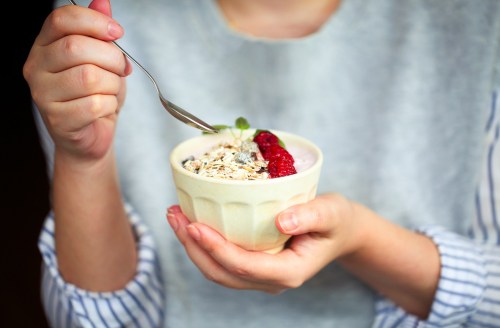Yes, you should care about cholesterol at every age—here’s how to keep it in check
These simple diet and lifestyle changes are scientifically proven to help keep cholesterol levels healthy.

Of all the conversation topics that tend to arise in the SoulCycle lobby or at your monthly book club meeting—bad dates, good brunches—cholesterol probably isn’t one of them. “It’s not super common for women in their 20s and 30s to be worried about their cholesterol,” says New York City-based dietitian Kelly Hogan, MS, RD. “But high cholesterol is something we see in younger women, and it’s something worth getting checked out at your yearly physical.”
First, it’s worth noting that cholesterol is not necessarily a dirty word. There are two types of cholesterol: LDL (low-density lipoproteins) and HDL (high-density lipoproteins). LDL is the bad one, while HDL is the one you want to befriend. Oftentimes, young women who do have high cholesterol have it because it runs in their family. But unless you get it checked, you probably won’t know—there aren’t generally symptoms indicating high cholesterol. Instead, it’s one of those things that manifests and can eventually lead to heart disease, heart attacks, or strokes.
That’s the bad news. The good news is that there are loads of lifestyle changes you can make to help keep your cholesterol levels in the healthy range.
Read on for six science-backed ways to help lower your cholesterol naturally.

1. Up your soluble fiber intake
Soluble fibers are those that get gummy when wet. “Think chia seeds and oats,” says Hogan. These fibers bind to the “bad” cholesterol in your digestive system and help the body get rid of it, while helping to reduce the absorption of cholesterol in the bloodstream. Hogan’s favorite soluble fiber-rich foods are whole grains, beans, apples, berries, oranges, citrus fruits, and eggplants. She says most women should aim to consume between 20–35 grams of fiber per day, of which 5–10 grams should be soluble fiber.
2. Consider soy products
Several soy products—tofu, soy milk, tempeh, and edamame—can help lower LDL cholesterol, Hogan says. Note that the same isn’t true of most highly processed soy products, like soy-based protein bars or protein powders.
3. Say yes to seafood
Fatty fish high in omega-3s, like salmon, tuna, sardines, and mackerel, are loaded with heart-healthy benefits, and can ultimately help lower LDL cholesterol. “Keep it varied, though,” Hogan says. “Don’t have tuna every single day, but work a variety of fatty fish into your diet a few times per week.” This will help limit your mercury exposure—tuna’s exceptionally high in the heavy metal, which can be potentially dangerous.

4. Cut back on saturated and trans fats—and reconsider your coconut oil addiction
A diet high in saturated fat has been shown to increase cholesterol. If you’re worried about your cholesterol rising, consider cutting back on red meat, full-fat dairy products, and coconut oil. (Sorry!) “Coconut oil, which is touted as this magical thing sometimes, is really high in saturated fat,” Hogan warns. “Even though it’s different in structure than the saturated fat you get from butter, I still encourage limiting it if you have high cholesterol.” Hogan recommends opting for low-fat dairy products or dairy substitutes, like soy yogurt or almond milk.
Trans fats are the worst types of fat to consume if you have high cholesterol, Hogan says. They increase LDL cholesterol and lower HDL cholesterol—a double whammy. So ditch the processed baked goods and fast foods.
5. Go nuts
Almonds, walnuts, and peanuts can all help lower cholesterol. “People who eat nuts tend to have lower cholesterol and reduced risk of various chronic illnesses,” says Hogan. “It may be because they lead a healthier lifestyle overall. Or it might be the nuts. We’re not exactly sure, but either way, unless you’re allergic, there’s no reason not to eat nuts on a regular basis.” As if we needed another excuse to drizzle almond butter on everything.
6. Get a move on
Exercise helps lower LDL cholesterol and raise HDL cholesterol. Moderate-to-high intensity aerobic activity and high-rep, low-weight resistance training have both been found to be exceptionally effective in balancing cholesterol levels, but any kind of movement is better than nothing. Plus, it could help reduce any fatigue caused by high cholesterol or a sedentary lifestyle.
“Find something you like doing and start doing it or do more of it,” Hogan says. Your heart will thank you—and your brain probably will, too.
And what if you’ve done all of the above, but your cholesterol is still less than optimal? “Making all these changes is helpful and may delay your need to go on cholesterol-lowering medications, but sometimes you may need them anyway,” says Hogan. “Our diets can only take us so far, especially if you’re dealing with a genetic condition that’s hard to control with diet and exercise alone.” In other words: Eat your fish and listen to your doctor.
Another thing that might keep your cholesterol levels healthy: Being in a happy relationship. And if you’re planning to get your cholesterol checked, one doctor recommends getting these tests done, too.
Sign Up for Our Daily Newsletter
Get all the latest in wellness, trends, food, fitness, beauty, and more delivered right to your inbox.
Got it, you've been added to our email list.










